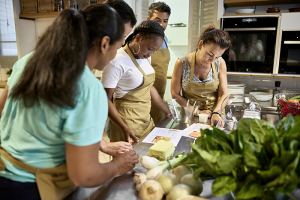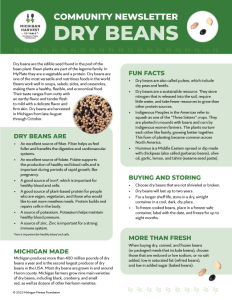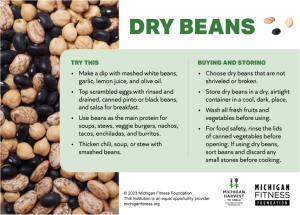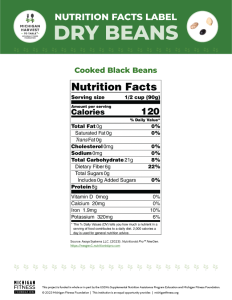Michigan produces more than 300 commodities, making the state the second in the nation for agricultural variety. Michigan Harvest to Table™ (MIHarvest™) makes a great addition to established nutrition education programs. It introduces participants to Michigan grown produce in a fun and effective way.
The goal of MIHarvest™ is to provide knowledge and skills-based strategies that are:
- Standardized
- Replicable
- Cost-effective
- Convenient
JUMP TO:
What’s included? | Materials | Featured produce | Subscribe now
Michigan produces more than 300 commodities, making the state the second in the nation for agricultural diversity. Michigan Harvest to Table™ (MIHarvest™) makes a great addition to established nutrition education programs. It introduces participants to Michigan grown produce in a fun and effective way.
The goal of MIHarvest™ is to provide knowledge and skills-based strategies that are:
- Standardized
- Replicable
- Cost-effective
- Convenient

Designed to inspire and empower participants to eat a variety of fruits and vegetables, the program is based on Michigan Fitness Foundation’s Michigan Harvest of the Month™ program, which was developed and designed for use in multiple publicly funded federal and state public health and education programs.
Designed to inspire and empower participants to eat a variety of fruits and vegetables, the program is based on Michigan Fitness Foundation’s Michigan Harvest of the Month™ program, which was developed and designed for use in multiple publicly funded federal and state public health and education programs.

Over the years, evaluation results for Michigan Harvest of the Month™ had exciting results. For example, teachers surveyed said:
- The program materials were easy to use
- Students were engaged when using the materials/activities
- They would use the resources again
Families surveyed said they added more fruits or vegetables to the meals they prepared, and their children were more likely to:
![]()
Eat more fruits and vegetables
![]()
Choose fruits as snacks
![]()
Try new recipes with vegetables
Each subscriber will have access to all MIHarvest™ digital and downloadable materials to fully implement the program. There are 29 featured Michigan grown fruits and vegetables in the program, and each produce item includes the following materials: an Educator Guide, Community Newsletter, Recipe Card, and Nutrition Facts Label. Additionally, subscribers will receive the Ensuring Success User Guide, MIHarvest™ Seasonality Posters, and USDA MyPlate Posters.
Materials
Educator Guides
MIHarvest™ Educator Guides help educators plan and deliver supplemental nutrition education in schools and community environments. The content includes general information about each fruit and vegetable, history, agriculture facts and figures, fun facts, information about health benefits and nutrition, hands-on activities, resources to explore each fruit and vegetable using sensory skills, recipes for optional tastings, and handouts for participants to take home. Many components of the Educator Guides, including applicable class activities and handouts, are also available as downloadable PDFs for easy reference and printing.

Educator Guides
MIHarvest™ Educator Guides help educators plan and deliver supplemental nutrition education in schools and community environments. The content includes general information about each fruit and vegetable, history, agriculture facts and figures, fun facts, information about health benefits and nutrition, hands-on activities, resources to explore each fruit and vegetable using sensory skills, recipes for optional tastings, and handouts for participants to take home. Many components of the Educator Guides, including applicable class activities and handouts, are also available as downloadable PDFs for easy reference and printing.

Community Newsletters
MIHarvest™ Community Newsletters takes the content from the learning environment to the home. Each newsletter includes select information from the educator guide such as fun facts and health benefits along with tips for selecting, storing, and serving the featured produce item, and a nutritious recipe. Community Newsletters are formatted as PDF files so they may be downloaded and distributed digitally or printed for participants to take home.

Recipe Cards
The MIHarvest™ Recipe Cards feature a nutritious recipe on one side and tips about the featured fruit or vegetable on the other. They are also designed as a downloadable PDF for digital distribution and for printing so participants can make the recipes with their family at home.

Recipe Cards
The MIHarvest™ Recipe Cards feature a nutritious recipe on one side and tips about the featured fruit or vegetable on the other. They are also designed as a downloadable PDF for digital distribution and for printing so participants can make the recipes with their family at home.


Nutrition Facts Labels
A Nutrition Facts Label is available as a downloadable PDF for each MIHarvest™ fruit and vegetable. Nutrition Facts Labels are used as a learning tool for participants to understand how to read the label to make healthy food choices and learn about the nutrients associated with each featured fruit and vegetable.
Nutrition Facts Labels
A Nutrition Facts Label is available as a downloadable PDF for each MIHarvest™ fruit and vegetable. Nutrition Facts Labels are used as a learning tool for participants to understand how to read the label to make healthy food choices and learn about the nutrients associated with each featured fruit and vegetable.

![]()
Featured Produce – Fruits and Vegetables
1 Apples
2 Asparagus
3 Beets
4 Bell Peppers
5 Broccoli
6 Cabbage
7 Carrots
8 Citrus Fruits
9 Cooking Greens
10 Corn
11 Cucumber
12 Dried Fruits
13 Dry Beans
14 Grapes
15 Green Beans
16 Melons
17 Peaches
18 Pears
19 Peas
20 Plums
21 Potatoes
22 Salad Greens
23 Spinach
24 Strawberries
25 Summer Squash
26 Sweet Potatoes
27 Tomatoes
28 Winter Squash

2 Asparagus
3 Beets
4 Bell Peppers
5 Broccoli
6 Cabbage
7 Carrots
8 Citrus Fruits
9 Cooking Greens
10 Corn
11 Cucumber
12 Dried Fruits
13 Dry Beans
14 Grapes
15 Green Beans
16 Melons
17 Peaches
18 Pears
19 Peas
20 Plums
21 Potatoes
22 Salad Greens
23 Spinach
24 Strawberries
25 Summer Squash
26 Sweet Potatoes
27 Tomatoes
28 Winter Squash


